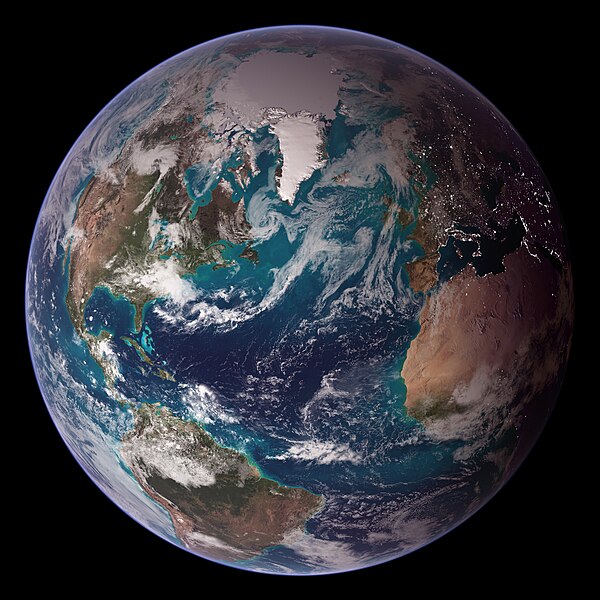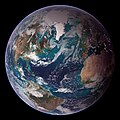Ta'ãnga:Blue Marble Western Hemisphere.jpg

Marandurenda moambue'ỹre (3718 × 3718 píxeles; tamaño de archivo: 2,65 MB; tipo MIME: image/jpeg)
Ko marandurenda haꞌehína Wikimedia Commons guive ha ikatu ojeipuru ambue tembiaporãme. Pe ñemombeꞌupy oĩva marandurenda ñemombeꞌupy kuatia ryepýpe ojehechauka koꞌápe.
Resumen
| Mombe'uangaBlue Marble Western Hemisphere.jpg |
English: RELEASE DATE: OCTOBER 9, 2007
Credit: NASA/Goddard Space Flight Center/Reto Stöckli A day’s clouds. The shape and texture of the land. The living ocean. City lights as a beacon of human presence across the globe. This amazingly beautiful view of Earth from space is a fusion of science and art, a showcase for the remote-sensing technology that makes such views possible, and a testament to the passion and creativity of the scientists who devote their careers to understanding how land, ocean, and atmosphere—even life itself—interact to generate Earth’s unique (as far as we know!) life-sustaining environment. Drawing on data from multiple satellite missions (not all collected at the same time), a team of NASA scientists and graphic artists created layers of global data for everything from the land surface, to polar sea ice, to the light reflected by the chlorophyll in the billions of microscopic plants that grow in the ocean. They wrapped these layers around a globe, set it against a black background, and simulated the hazy edge of the Earth’s atmosphere (the limb) that appears in astronaut photography of the Earth. The land surface layer is based on photo-like surface reflectance observations (reflected sunlight) measured by the Moderate Resolution Imaging Spectroradiometer (MODIS) on NASA’s Terra satellite in July 2004. The sea ice layer near the poles comes from Terra MODIS observations of daytime sea ice observed between August 28 and September 6, 2001. The ocean layer is a composite. In shallow water areas, the layer shows surface reflectances observed by Terra MODIS in July 2004. In the open ocean, the photo-like layer is overlaid with observations of the average ocean chlorophyll content for 2004. NASA’s Aqua MODIS collected the chlorophyll data. The cloud layer shows a single-day snapshot of clouds observed by Terra MODIS across the planet on July 29, 2001. City lights on Earth’s night side are visualized from data collected by the Defense Meteorological Satellite Program mission between 1994–1995. The topography layer is based on radar data collected by the Space Shuttle Endeavour during an 11-day mission in February of 2000. Topography over Antarctica comes from the Radarsat Antarctic Mapping Project, version 2. Most of the data layers in this visualization are available as monthly composites as part of NASA’s Blue Marble Next Generation image collection. The images in the collection appear in cylindrical projection (rectangular maps), and they are available at 500-meter resolution. The large images provided above are the full-size versions of these globes. In their hope that these images will inspire people to appreciate the beauty of our home planet and to learn about the Earth system, the developers of these images encourage readers to re-use and re-publish the images freely. NASA images by Reto Stöckli, based on data from NASA and NOAA. To learn the history of the Blue Marble go here: earthobservatory.nasa.gov/Features/BlueMarble/BlueMarble_... To learn more about the Blue Marble go here: earthobservatory.nasa.gov/IOTD/view.php?id=8108 NASA Goddard Space Flight Center is home to the nation's largest organization of combined scientists, engineers and technologists that build spacecraft, instruments and new technology to study the Earth, the sun, our solar system, and the universe. Follow us on Twitter Join us on FacebookEspañol: Mosaico de fotografías del hemisferio occidental, proyectadas sobre una esfera y procesadas.
Polski: Mozaika zdjęć półkuli zachodniej, zrzutowana na sferę i poddana obróbce.
Русский: Изображение, составленное из мозаики фотографий Западного полушария Земли из космоса
Українська: Мозаїка фотографій Західної півкулі Землі, спроектованих на сферу та оброблених. |
| Arange | |
| Moõgui oguenohẽ | Earth Observatory: Twin Blue Marbles |
| Apohára | NASA images by Reto Stöckli, based on data from NASA and NOAA. Instrument: Terra - MODIS |
Valoración
|

|
This image was selected as picture of the day on Wikimedia Commons for 30 November 2023. It was captioned as follows: English: The Blue Marble (2007) Other languages:
Čeština: Modrá skleněnka foto z roku 2007. Deutsch: Die westliche Hemisphäre der Erde, zusammengesetzt aus unterschiedlichen Einzelaufnahmen. English: The Blue Marble (2007) Español: Mosaico de fotografías del hemisferio occidental, proyectadas sobre una esfera y procesadas. Esperanto: la Blua Globeto Français : L'hémisphère ouest de la Terre vu depuis l'espace, avec le continent américain à gauche et l'Europe et l'Afrique à droite. Photo recréée par la NASA en fusionnant plusieurs images prises par différentes missions spatiales. Magyar: A Föld nyugati féltekéjéről készült fényképek mozaikja gömbre vetítve és feldolgozva Nederlands: Blue Marble (2007) Polski: Mozaika zdjęć półkuli zachodniej, zrzutowana na sferę i poddana obróbce. Português: Mosaico de fotografias do hemisfério ocidental, projetadas em uma esfera e processadas. Македонски: Западната полутопка на Земјата. Русский: Изображение, составленное из мозаики фотографий Западного полушария Земли из космоса. Українська: Мозаїка фотографій Західної півкулі Землі, спроектованих на сферу та оброблених. 中文: 《藍色彈珠》,拍摄于2007年 |
Licencia
| Public domainPublic domainfalsefalse |
| Este archivo es de dominio público porque fue creado por la NASA. Las políticas sobre copyright de la NASA estipulan que «el material de la NASA no está protegido con copyright a menos que se indique lo contrario». (Políticas sobre copyright de la NASA o Políticas sobre la utilización de imágenes del Jet Propulsion Laboratory). |  | |
 |
Advertencias:
|
Leyendas
Elementos representados en este archivo
representa a español
2 jasypa 2007
tipo de archivo español
image/jpeg
suma de verificación español
b5dd857151115a7d60daa395c0004753355707c8
tamaño de los datos español
2 778 554 byte
altura español
3718 píxel
ancho español
3718 píxel
Marandurenda rembiasakue
Ejopy peteĩ ára/aravo rehe rehecha hag̃ua pe marandurenda ojehechaukaháicha upe jave.
| Ára/Aravo | Michĩháicha | Tuichakue | Puruhára | Jehaimombyky | |
|---|---|---|---|---|---|
| ko’ag̃agua | 11:59 5 jasyapy 2013 |  | 3718 × 3718 (2,65 MB) | Szczureq | User created page with UploadWizard |
Marandurenda jeporu
No hay páginas que enlacen a este archivo.
Apopyme'ẽ
Ko marandurenda oguereko marandu ambuéva, oiméne oñembojoapýva kámara térã escáner ojeporúvagui ojejapo térã oñemoha'anga hag̃ua.
Oñemoambuéramo ko marandurenda iñemohenda ypykuégui, ikatu oĩ sa'imi ndohechaukái hekopete pe marandurenda oñemoambuéva.
| Título de la imagen |
|
|---|---|
| Autor | stockli |
| Orientación | Normal |
| Resolución horizontal | 72 ppp |
| Resolución vertical | 72 ppp |
| Software usado | Adobe Photoshop 7.0 |
| Fecha y hora de modificación del archivo | 08:43 2 jasypa 2007 |
| Espacio de color | Sin calibrar |
| Versión IIM | 2 |
